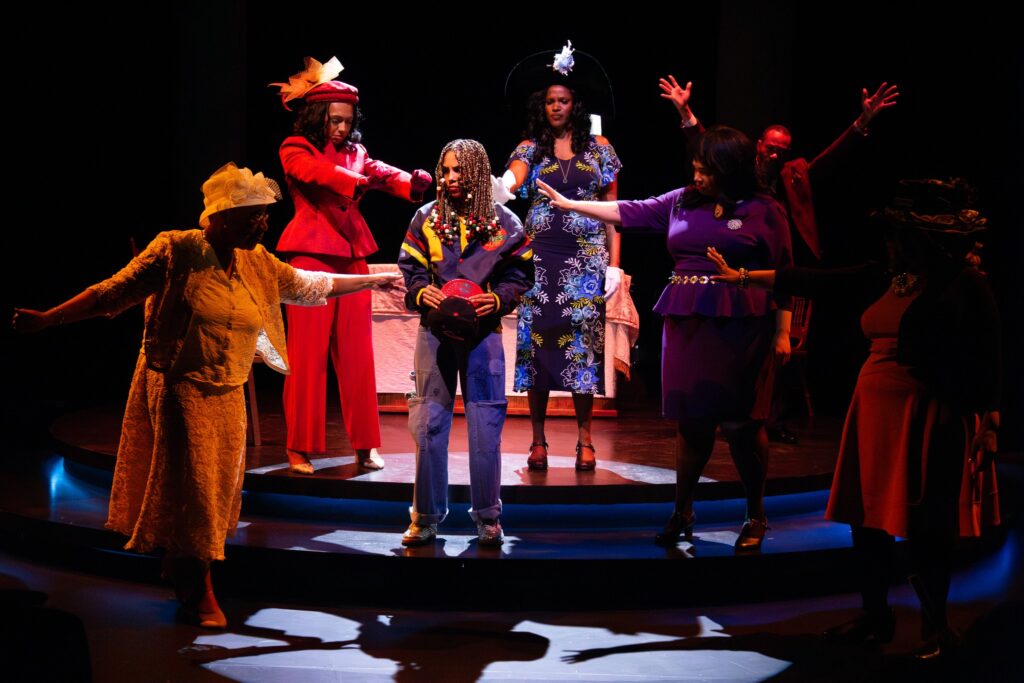
Cast photo by Chelcy Garrett.
Presented by Moonbox Productions
Community Partner: Rosie’s Place
By Regina Taylor
Adapted from the book by Michael Cunningham and Craig Marberry
Directed by Regine Vital
Associate Directed by Davron Monroe
Music Directed by David Coleman
Music Accompaniment by David Freeman Coleman (keyboard) and Brandon Mayes (drums)
Costume Design by E Rosser
Set Design by Baron E. Pugh
Featuring: Cortlandt Barret, Janelle Grace, Kaedon Gray, Lovely Hoffman, Mirrorajah, Cheryl D. Singleton, Mildred E. Walker
April 11th – May 4th
Arrow Street Arts
2 Arrow St., Cambridge, MA 02138.
Tickets here
Article by Maegan Bergeron-Clearwood
CAMBRIDGE, Mass. — After a long, dark winter, Crowns is a musical manifestation of springtime, bursting with color, decadence, and jubilation. Regina Taylor’s musical is adapted from Michael Cunningham and Craig Marberry’s photography/oral history book of the same name, and it’s been a staple of the American regional theatre scene for over two decades. Although this musical celebration of African American womanhood is in many ways timeless, Moonbox Production’s staging, directed by Regine Vital, is impeccably here-and-now, coming across as a breath of sweet, fresh air in this dire political moment.
Crowns is largely structured like a church worship service, but it is bookended by Yoruban ritual. The first sounds we hear come from Man/Elegba’s (the only male character, played by Kaedon Gray) staff during the processional prologue, a heartbeat that echoes through the play and draws a clear connection between Black church culture and African tradition. Crowns proceeds with a scant narrative: Yolanda (Mirrorajah), a young, hardened teen, is sent from Brooklyn to the South after her brother is killed. There, her grandmother (Mildred E. Walker) welcomes her into a community of Church Ladies, who regale Yolanda with stories about their most sacred, royal accessory: hats.
Hats serve as a conduit through which the women transcend memory, history, and space. One by one, they step onto a circular dais and before an altar (set design by Baron E. Pugh) to weave stories that harken back to African rituals to the civil rights movement to the 21st century and back again. The monologues are exquisite in their attention to detail, such that they feel like time travel, despite the minimal props and costumes.
These moving stories of joy and sorrow are told by individual women, but they are never told alone. In this theatrical ritual, stories are sermon, so the women join the audience as members of the congregation, buoying each other with applause and full-throated ‘amens.’ The shining gem of this production, however, is the gospel music, which not only sounds sublime, but also weaves the women’s individual experiences together into a collective expression of love.
This auditory resplendence is complemented by simple but powerful visual touches, helmed by costume designer E Rosser. The Church Ladies are decked out in jewel tones, eye-catching reds and blues and yellows that reminded me of the distinct but cohesive dresses worn in productions of Ntozake Shange’s choreopoem, for colored girls who have considered suicide/when the rainbow is enuf. The hats themselves – dozens and dozens of bedecked and bejeweled works of art – are given royal treatment, treated with so much reverence that they feel like characters of their own.
The production’s momentum comes screeching to a halt whenever Yolanda’s linear framing device reappears. Her story of connecting to her heritage is heartwarming, but it pales in comparison to the ensemble’s vibrant anecdotes. Other than these brief interruptions and a few choice movements of stillness, the production clips along at a breathless pace. It’s hard to not get swept away by the boundless, heart-opening joy.
I’m struck by the parallels between Crowns and another ritualistic musical that I had the privilege of seeing in Boston this spring: Night Side Songs at the A.R.T. Crowns is markedly more buoyant and overtly spiritual, but both productions encourage the audience to join in on the musical experience. Night Side Songs is more explicit about the expectations for audience interactivity, resulting in a more communal experience; comparatively, during the performance of Crowns that I attended, the hymnals that were placed on the chairs went barely touched, which feels like a missed opportunity for audience participation.
Still Crowns is an open invitation to come and be in community. I caution anyone with religious trauma to be cautious when considering seeing this play, but otherwise, this musical is a unique opportunity to join your neighbor in song, celebration, and hope.
